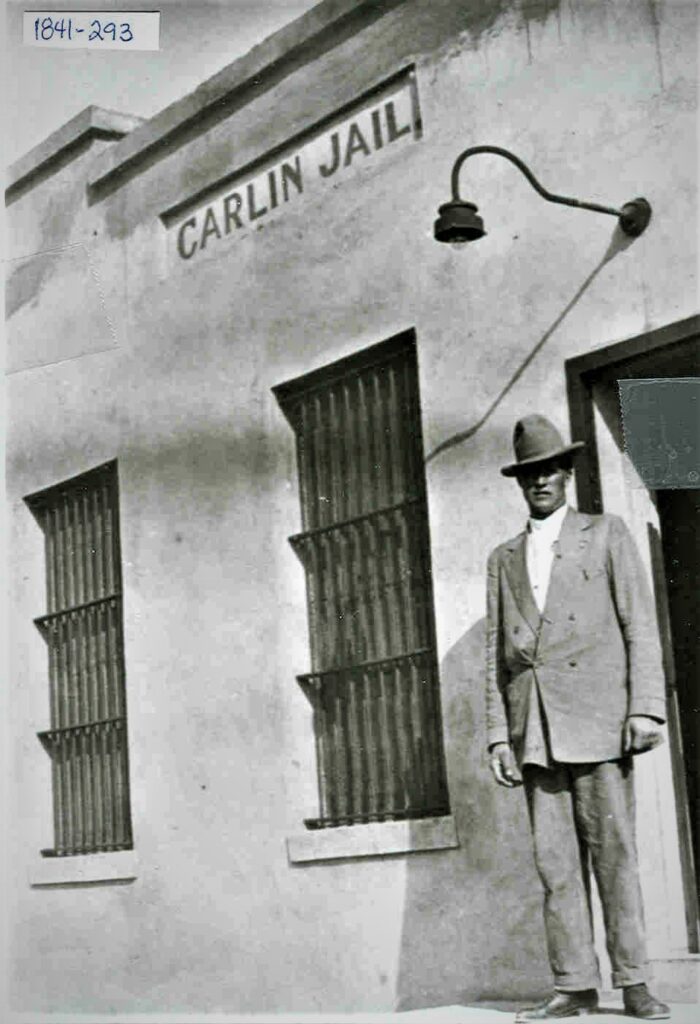Carlin had a variety of town constables in the early years but one of its longest-serving officers was Adolph Berning, also known as Dolph. Constable Berning was elected in 1916 at the age of 31. He beat the incumbent, Charles Kappler. Kappler had been born in Carlin. Prior to Kappler, a man named Cozzens, who owned and operated the Railroad Hotel on Main Street, was constable. It is unclear for how long.

Constable Berning had moved to Carlin in 1905 to work for the railroad. After his election in 1916, he would serve as Carlin’s constable until his death in 1942. His job as Carlin’s peace keeper kept him very busy and by all accounts he was very good at his job. He regularly caught criminals that had slipped through the fingers of other peace officers in nearby communities. He was also active in the community during World War II when he served on the Elko County Defense Council as the police and air raid warden. He also helped organize and direct local Conservation Corps projects in the area in the 1930s. His death came at the hands of two young men who escaped a reform school in Indiana and were making their way west committing crimes as they went. This wasn’t uncommon. In fact, Constable Berning had arrested a trio of three young men from Cincinnati, who had stolen a car and were on their way to San Francisco, just a few years earlier. But, in 1942, the youth he tried to apprehend at Emigrant Pass near Carlin was armed and fatally shot Constable Berning.
The two young men, both 15 years of age, were Floyd Loveless and Dale Cline. They had escaped from an Indiana reformatory school in a stolen car. In Elko, the two argued and Loveless stole a truck for his own use. Loveless continued in the stolen truck westward while Cline followed him in the car. Upon discovering the theft of the truck, word was sent to Constable Berning of Carlin to intercept the truck. Berning successfully pulled over the truck but when he tried to physically remove Loveless from the vehicle Loveless shot him. Berning fell forward into the truck, Loveless shot him again and then started off again. He soon stopped and Cline encouraged him to abandon the truck. Loveless agreed and the two left Berning in the truck. He was found soon afterwards by other law enforcement officers and he was taken to the hospital in Elko but he succumbed to his wounds. A funeral for Berning was held a couple of days later in the “flower-banked auditorium of Carlin High School”.
Floyd Loveless was charged with the murder of Dolph Berning. He initially pled not guilty but he admitted to the slaying on the stand during trial with the hope that he could avoid the death penalty. At the time of trial, he was but 16 years old. The jury found him guilty of murder and under Nevada law, the judge was obligated to sentence him to death but such a sentence could be commuted by the Board of Pardons or the governor. The case was appealed to the Nevada Supreme Court and a stay of execution was granted. After review, the Nevada Supreme Court ordered a new trial after finding that the jury failed to state specifically what degree of guilt that Loveless was found guilty of. Specifically, was he guilty of murder in the first degree or second degree? The new trial opened on November 16, 1943, and concluded on November 17th. The jury found Loveless guilty of first-degree murder. Loveless was committed to the care of the Nevada State Prison where he would await his execution in the gas chamber unless granted a commutation of sentence. His execution was finally scheduled for September 29, 1944, and by that time he was almost 18 years old. He was the youngest person to ever be executed in the State of Nevada.
His case became a national headline and people from all over the state and country wrote to him, the governor, and the warden of the Nevada State Prison begging that he not be executed. But, alas, his plea went unanswered.
Chillingly, in an odd foreshadowing of the future, Constable Berning arrested a man named Luther Jones, for disturbing the peace in Carlin in 1936. Unbeknownst to Berning, Jones had brutally murdered four men just days earlier in Elko. When arrested by Berning, Jones oddly asked how criminals were executed in Nevada. Berning replied that criminals were executed by gas in Carson City.
